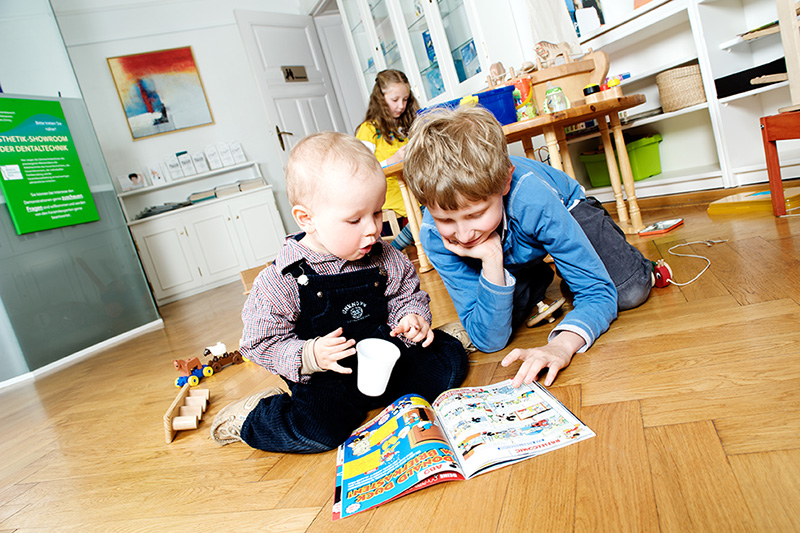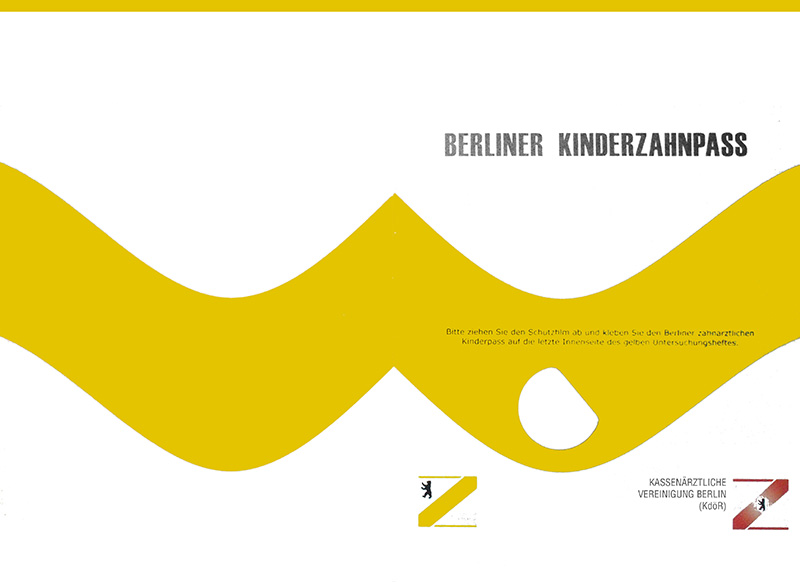Treatments
Pediatric Dentistry
Dear Parents,
The foundations for preserving one’s own teeth up until old age are laid in the years between birth and puberty.
Paedodontology includes the following sections:
Prophylaxis aiming at dental health and the correct positioning of teeth
Brushing training
Motivation to maintain proper dental hygiene
Fissure sealing of primary and permanent teeth
Fluoridation
The intraoral scanner with Niri technology enables early detection of caries WITHOUT harmful X-rays
Caries treatment
If necessary, tooth removal (early primary tooth removal)
Orthodontics
Treatment of the consequences of accidents.
We would like to work with you and your child to make your visit to the dentist a pleasant and relaxing experience. The dental practice Drs. Zimny, Dr. Zimny-Schattling & Colleagues have put together some information for you about your child's first visit to the dentist and how to care for your child's teeth.

Even if milk teeth are later replaced by permanent teeth, they are the prerequisite for a harmonious dental arch and a radiant smile in adolescence and adulthood. The milk teeth should be cared for with dedication and given special attention right from the start.
If you have any further questions on the big topic of “My child and his teeth”, we would be happy to speak to you personally at any time and look forward to meeting you with your offspring in the dental practice Drs. Zimny, Dr. Zimny-Schattling and colleagues.
Your dentist family at the Kaiserdamm in Berlin
Dr. Zimny, Dr. Zimny-Schattling & Colleagues
How to prepare my child for treatment at the dentist?
Our tip
If you talk about going to the dentist at home, remember that your child is always listening: Avoid talking about fear and pain!
A negative experience at the dentist can last a lifetime, as we find with many adults. For this reason, we believe it is particularly important to treat young patients in a trusting manner. We take a lot of time to treat children, work particularly sensitively and tell stories about Karius and Bactus. If a parent is afraid of going to the dentist and expresses this out loud, this fear can be passed on to the child. Therefore, do not speak negatively about the dentist and let the child have their own, unbiased experience.

Read children's books with your child that explain what a visit to the dentist is like. You can also mention that every child receives a gift at the end of the treatment when they have opened their mouth nicely.
What can your child expect from the Dentist Family at Berlin Kaiserdamm?
Our tip
Please do not make promises to your child that the dentist may not be able to keep. Please do not make statements in front of your child such as “it doesn’t hurt at all”, “you don’t notice anything”, or “you won’t get an injection”.
Your child can expect the following: there is a comfortable TV chair that can move up and down and a bright sun that shines down so that the dentist can see clearly. To look inside the mouth, the dentist has a small mirror and a pen that tickles the teeth. There is even a small washing machine to wash away Karius and Bactus, as well as a small hair dryer for drying, on the high-tech armchair. Not to forget the mini vacuum cleaner, which makes just as much noise as the large vacuum cleaner at home.
We know from experience that false promises made by parents often lead to resistance to treatment. Please also remember that only when the dentist asks a question do you let your child answer.
It's best to take your child to the dentist early (see Berlin Children's Dental Pass). A perfect occasion for this would be your own check-up appointment. This doesn't take that long and your child doesn't lose patience. A relationship of trust can be built with the dentist and your child will quickly realize that the visit is not bad at all, but completely normal. During this appointment, the child can be introduced to the dental chair and the accessories in a playful way. In this way, children become familiar with the atmosphere, smells and sounds of a dentist's practice early on and see that it is completely normal to open their mouth and have their teeth counted and looked at.
Special rewards are also not necessary. A small recognition is enough; the child should see going to the dentist as something natural. In addition, our practice gives a small gift from our treasure chest to every little patient who cooperated well.
Our tip
Never threaten your child with a visit to the dentist: “If you don’t brush your teeth, you’ll have to go to the dentist!” The dentist becomes a bogeyman and this makes it much more difficult for us to interact with your child in a relaxed, unburdened manner.

Prophylaxis and Brushing Training in our dental practice
From the age of 6 to 18, a child with Statutory health insurance is entitled to Prophylaxis and Professional teeth cleaning twice a year. The teeth are coloured by one of our specially trained Prophylactic Assistants making the plaque visible and then removed gently. For more information see also Professional Teeth Cleaning.
Dental care at home and Fluoridation Measures
In general, when it comes to dental care at home, this motto applies to parents of small children (1-3 years) : “All power to the parents”. Screaming, crying or bucking should not have any influence on the duration of dental care.
The child's teeth must be brushed by the parents until the age of 8, as the children's fine motor skills are not yet sufficient.
Our tip
When it comes to dental care at home, the role parents give to dental care is crucial to success. Whether you like dental care yourself or whether you neglect it, it will be passed on to your offspring.
Our tip
To simplify application, “dental floss harps”, in which a piece of dental floss is stretched between two holding arms, have proven to be useful. We would be happy to show you corresponding models in the dental practice.
Dental floss
As long as there are no pronounced gaps between the teeth, you should floss at least every two days for interdental care, even with milk teeth, because the toothbrush cannot clean between the teeth, no matter how well and for how long you brush your teeth.
Fluoridation
Fluoridation measures aim to achieve the best possible caries protection. The DGZMK (German Society for Dentistry, Oral and Maxillofacial Medicine) today recommends the following for fluoridation:
According to current recommendations, from the time the first milk tooth emerges until the age of 2, an amount of fluoridated children's toothpaste the size of a grain of rice with a fluoride concentration of 1000 ppm fluoride should be used twice a day. From the age of 2 to 6 years a pea-sized amount of children's toothpaste with a fluoride content of 1000 ppm should be used twice a day.
There should NOT be any additional systemic fluoride intake (e.g. through tablets in the form of fluorettes).
Otherwise, excessive fluoride intake can cause visible, permanent, white spots to appear in the outermost coat of the teeth, the enamel of the teeth (fluorosis).
From the age of 6, brushing should be done twice daily with a junior or adult toothpaste with a fluoride content of approximately 1450 ppm. The full brush should be moistened with toothpaste.
Our tip
It is not recommended to take additional fluoride in the form of tablets. Using fluoridated table salt and fluoridated toothpaste is sufficient.
Berlin children's dental passport
Healthy milk teeth are the prerequisite for a healthy, permanent dentition and ensure that the permanent teeth erupt normally. The Berlin Children's Dental Pass is available for all Berlin residents up to the age of 6. The Berlin children's tooth passport is attached to the traditional yellow pediatric examination booklet and is firmly attached to it or it will be given to you by our staff.

Our practice Dentist Family Drs. Zimny, Dr. Zimny-Schattling & Colleagues are members of:
Treatments
You are currently viewing a placeholder content from YouTube. To access the actual content, click the button below. Please note that doing so will share data with third-party providers.
More Information
